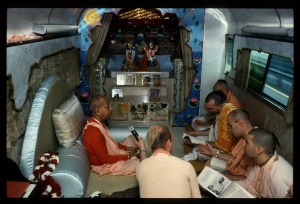BG 5.3: Difference between revisions
m (1 revision(s)) |
No edit summary |
||
| Line 1: | Line 1: | ||
{{ | [[Category:Bhagavad-gita As It Is (1983+) - Chapter 05|b03]] | ||
<div style="float:left">'''[[Bhagavad-gita As It Is (1983+)]] - [[BG 5 (1983+)|Chapter 5: Karma-yoga — Action in Krsna Consciousness]]'''</div> | |||
<div style="float:right">[[File:Go-previous.png|link=BG 5.2]] '''[[BG 5.2]] - [[BG 5.4]]''' [[File:Go-next.png|link=BG 5.4]]</div> | |||
{{CompareVersions|BG|5.3|BG 1972|BG 1983+}} | |||
{{RandomImage}} | |||
==== TEXT 3 ==== | ==== TEXT 3 ==== | ||
<div class="devanagari"> | |||
:ज्ञेयः स नित्यसंन्यासी यो न द्वेष्टि न काङ्क्षति । | |||
:निर्द्वन्द्वो हि महाबाहो सुखं बन्धात्प्रमुच्यते ॥३॥ | |||
</div> | |||
<div | <div class="verse"> | ||
:jñeyaḥ sa nitya-sannyāsī | |||
:yo na dveṣṭi na kāṅkṣati | |||
:nirdvandvo hi mahā-bāho | |||
:sukhaṁ bandhāt pramucyate | |||
</div> | </div> | ||
==== SYNONYMS ==== | ==== SYNONYMS ==== | ||
<div class="synonyms"> | |||
<div | ''jñeyaḥ''—should be known; ''saḥ''—he; ''nitya''—always; ''sannyāsī''—renouncer; ''yaḥ''—who; ''na''—never; ''dveṣṭi''—abhors; ''na''—nor; ''kāṅkṣati''—desires; ''nirdvandvaḥ''—free from all dualities; ''hi''—certainly; ''mahā-bāho''—O mighty-armed one; ''sukham''—happily; ''bandhāt''—from bondage; ''pramucyate''—is completely liberated. | ||
</div> | </div> | ||
==== TRANSLATION ==== | ==== TRANSLATION ==== | ||
<div class="translation"> | |||
<div | |||
One who neither hates nor desires the fruits of his activities is known to be always renounced. Such a person, free from all dualities, easily overcomes material bondage and is completely liberated, O mighty-armed Arjuna. | One who neither hates nor desires the fruits of his activities is known to be always renounced. Such a person, free from all dualities, easily overcomes material bondage and is completely liberated, O mighty-armed Arjuna. | ||
</div> | </div> | ||
==== PURPORT ==== | |||
= | <div class="purport"> | ||
One who is fully in Kṛṣṇa consciousness is always a renouncer because he feels neither hatred nor desire for the results of his actions. Such a renouncer, dedicated to the transcendental loving service of the Lord, is fully qualified in knowledge because he knows his constitutional position in his relationship with Kṛṣṇa. He knows fully well that Kṛṣṇa is the whole and that he is part and parcel of Kṛṣṇa. Such knowledge is perfect because it is qualitatively and quantitatively correct. The concept of oneness with Kṛṣṇa is incorrect because the part cannot be equal to the whole. Knowledge that one is one in quality yet different in quantity is correct transcendental knowledge leading one to become full in himself, having nothing to aspire to or lament over. There is no duality in his mind because whatever he does, he does for Kṛṣṇa. Being thus freed from the platform of dualities, he is liberated—even in this material world. | |||
</div> | |||
<div | <div style="float:right; clear:both;">[[File:Go-previous.png|link=BG 5.2]] '''[[BG 5.2]] - [[BG 5.4]]''' [[File:Go-next.png|link=BG 5.4]]</div> | ||
__NOTOC__ | |||
</div> | __NOEDITSECTION__ | ||
__NOTOC__ | |||
Revision as of 09:23, 14 December 2017

A.C. Bhaktivedanta Swami Prabhupada
TEXT 3
- ज्ञेयः स नित्यसंन्यासी यो न द्वेष्टि न काङ्क्षति ।
- निर्द्वन्द्वो हि महाबाहो सुखं बन्धात्प्रमुच्यते ॥३॥
- jñeyaḥ sa nitya-sannyāsī
- yo na dveṣṭi na kāṅkṣati
- nirdvandvo hi mahā-bāho
- sukhaṁ bandhāt pramucyate
SYNONYMS
jñeyaḥ—should be known; saḥ—he; nitya—always; sannyāsī—renouncer; yaḥ—who; na—never; dveṣṭi—abhors; na—nor; kāṅkṣati—desires; nirdvandvaḥ—free from all dualities; hi—certainly; mahā-bāho—O mighty-armed one; sukham—happily; bandhāt—from bondage; pramucyate—is completely liberated.
TRANSLATION
One who neither hates nor desires the fruits of his activities is known to be always renounced. Such a person, free from all dualities, easily overcomes material bondage and is completely liberated, O mighty-armed Arjuna.
PURPORT
One who is fully in Kṛṣṇa consciousness is always a renouncer because he feels neither hatred nor desire for the results of his actions. Such a renouncer, dedicated to the transcendental loving service of the Lord, is fully qualified in knowledge because he knows his constitutional position in his relationship with Kṛṣṇa. He knows fully well that Kṛṣṇa is the whole and that he is part and parcel of Kṛṣṇa. Such knowledge is perfect because it is qualitatively and quantitatively correct. The concept of oneness with Kṛṣṇa is incorrect because the part cannot be equal to the whole. Knowledge that one is one in quality yet different in quantity is correct transcendental knowledge leading one to become full in himself, having nothing to aspire to or lament over. There is no duality in his mind because whatever he does, he does for Kṛṣṇa. Being thus freed from the platform of dualities, he is liberated—even in this material world.